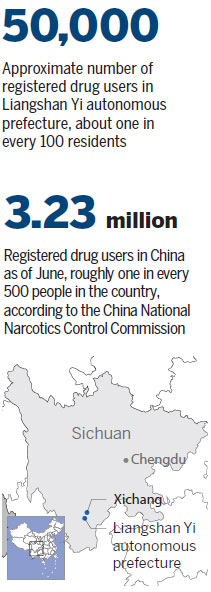|
Narcotics officers carry out a regular check on an intercity bus at a toll gate in Xichang on Dec 18. |
"I closed the restaurant and left my son to my parents and parents-in-law. We hid in our apartment all day. Apart from using, all we could think about was finding more drugs or getting money to buy drugs. I didn't want to work. Actually, I didn't want anything at all, except drugs. It was a nightmare," she said.
The couple gradually ran out of money and fought bitterly, according to Zhao.
"At first, we spent about 4,000 to 5,000 yuan every month. But soon, we wanted more and spent thousands and thousands. Lacking an income, we had to use our savings. Money became tight," he said.

For Liu, life became unbearable. "Because money was tight, we had to cut down on the amount of drugs we bought, but we fought over the limited supply. I could not bear him having more, and he would not allow me to have another hit either," she said.
Eventually, they sold their apartment.
"We were broke, and we still are," Liu said. "Someone reported us, and last year we were detained and sent to the rehabilitation center."
In China, drug abusers are sent to a rehab center after being reported and found using twice.
"I guess my parents tipped off the police, but I have never asked them. I don't hate them for having me locked up. On the contrary, I am grateful. If not for them, I would never have had the courage to come to the rehab center and get clean," Liu said.
The couple has completed a compulsory six-month term at the rehab center and voluntarily moved into a community rehab center.
"We chose to live here because I am not fully confident about myself. If I went home, I am afraid I would use again. My son is 5 and he will go to elementary school next year. I want be able to pick him up from school every day with no one calling his parents drug addicts," Liu said.
Liu was one of 1,775 drug abusers sent to Xichang No 1 Compulsory Rehabilitation Center this year. Addicts must live at the center for six months, and after that they can chose to go home or move to another rehab center .
"We encourage them to spend as long as possible in the rehab center because it makes it easier for them to get totally clean," Xia Hongyu, vice-head of the center, said.
"Xichang is not only a drug-smuggling hub, but also a market. Drugs are cheaper here than in the surrounding areas because there are no transportation costs. That's attractive to the many drug users who live and trade here," he said.
A long battle
In the 1950s, the authorities launched a fierce crackdown on Xichang's opium trade, eventually eradicating the drug from the area. However, as the drug trade became more profitable globally in the 1980s, the problem resurfaced.
The local government has redoubled its efforts to tackle the trade.
"The enemy has grown so quickly that our work has not quite reached a turning point, said Liang from the public security department, who added that anti-drug operations have been successful in recent years.
He also said the operation has progressed from targeting low-level mules to chasing the heads of the gangs.
This year, the police have tackled 64 drug networks and 1,093 drug-related crimes, a rise of 61 percent from last year. They also apprehended 1,375 suspects - an increase of 52 percent from a year ago - including 78 heads of drug gangs and 40 "sponsors", people who fund the smuggling and distribution of narcotics for a percentage of the profits.
The regional authorities will raise the number of narcotics officers to 300 from 168 in the next two years, and 790 assistant officers will also be hired. Meanwhile, the county plans to increase anti-drug investment during the upcoming Five-Year Plan (2016-2020), and will spend more than 20 million yuan upgrading equipment and 2.5 million yuan to train more sniffer dogs.
The rise in officer numbers will ease some of the burden on local policemen, such as Wu Ke, who heads a team that checks vehicles at toll gates.
"We examine a few hundred cars at toll gates every day, 24/7. It never stops," he said. According to Wu, 2 pm to 8 pm is the best time to catch mules.
"They cross the border early in the morning, but the first vehicles don't arrive at the toll gate until 2 pm. The last ones arrive at 8 pm. The mules use a range of vehicles, from buses to minivans. We can't stop every single one, so we use our experience to identify suspects," he said. "For example, if they look nervous or act oddly, they are likely to be carrying drugs."
In January, Wu's team intercepted three mules when the police ordered a car to stop for a routine check. Spooked, the driver immediately turned around and attempted to speed off. Two men and a pregnant woman were arrested after about 2.7 kilos of heroin were discovered in the car.
"If they hadn't acted so awkwardly and run from the toll gate, we might not have noticed them," Wu said.
Spreading the message
Last year, Liangshan launched a combined anti-drugs and AIDS awareness campaigns in 1,706 schools across the prefecture, covering 420,000 students.
"Most students have two parents and four grandparents, and we hope they will spread our message to the older generation and help them avoid the scourge of drugs," said Hua, the deputy principal.
